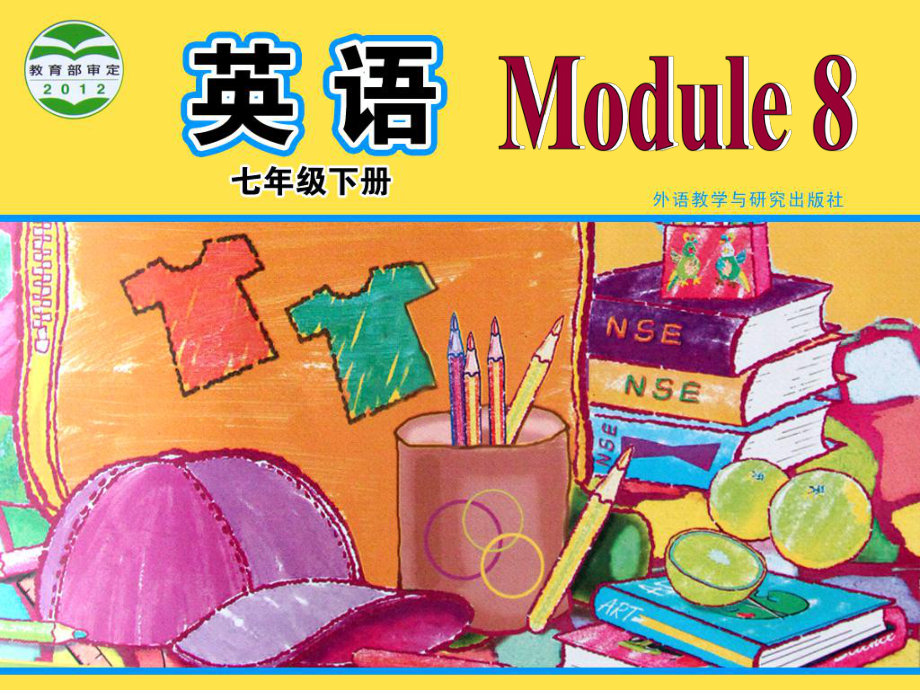《外研版初中英語七年級(jí)下冊(cè)Module 8Unit 2 Goldilocks hurried out of the house課件》由會(huì)員分享�,可在線閱讀,更多相關(guān)《外研版初中英語七年級(jí)下冊(cè)Module 8Unit 2 Goldilocks hurried out of the house課件(27頁珍藏版)》請(qǐng)?jiān)谘b配圖網(wǎng)上搜索����。
1、小組活動(dòng):讀這篇故事��,借助下面圖片小組活動(dòng):讀這篇故事�����,借助下面圖片的幫助,試著給你的搭檔把它講出來��。的幫助��,試著給你的搭檔把它講出來�����。return v. 返回��;歸還返回�;歸還e.g. Blair will return to London tonight.cry v. 哭;喊叫哭���;喊叫e.g. Did she cry too much?point v. 指向指向e.g. Point to the book, please.jump v. 跳跳e.g. I jump over the fence.shout v. 高聲說�����;大聲喊高聲說�����;大聲喊e.g. Dad, dont shout like
2�����、that.in pieces 破碎破碎e.g. My sunglasses were in pieces. 我的太陽鏡碎了�。我的太陽鏡碎了��。at first 起初�;首先起初;首先e.g. At first I felt great. 起初我感覺很好��。起初我感覺很好�。point at 指著指著 e.g. Its rude to point at a person. 用手指著人是不禮貌的。用手指著人是不禮貌的��。 I think Goldilocks decided to go home. Maybe she stayed in the house.Work in pairs. Say what h
3����、appened next in Goldilocks and the Three Bears.Read the next part of the story and number the pictures in the correct order.(2)(4)(5)(1)(3)1. Goldilocks opened her eyes, jumped out of bed and hurried out of the house. 2. She tried the small chair. 3. The Three Bears returned to their house.Match the
4、 sentences with the pictures in Activity 2.cda4. Baby Bear cried because there was nothing in his bowl and his chair was in pieces. 5. Baby Bear pointed at Goldilocks. She was asleep in his bed. ebCheck () the true sentences.( ) 1. Goldilocks liked the big chair. ( ) 2. Goldilocks liked the small be
5��、d.( ) 3. Baby Bear looked in the bedroom.( ) 4. The Three Bears were happy to see Goldilocks.( ) 5. Goldilocks didnt like the Three Bears.Complete the passage with the correct form of the words from the box.asleep either piece point return shout withoutGoldilocks tried the three chairs and liked the
6�����、 small chair, but she was very heavy and soon the small chair was in (1) _. She walked into the bedroom. She tried the middle bed, but it wasnt comfortable and the big bed wasnt comfortable (2) _. Very soon she was (3) _ in the small bed.pieceseitherasleep Then the Three Bears (4) _ to their house.
7���、They walked up to their bedroom. Baby Bear (5) _ at Goldilocks and (6) _, “Thats her! She finished my food and look at my chair!” Goldilocks jumped up and hurried out of the house (7) _ her basket. returnedpointedshoutedwithoutLook at the sentences.1. First, she tried the big chair.2. Then she tried
8�、 the middle chair. 3. Finally, she tried the small chair.pick up/ very big bowl/ didnt like/ too hot_pick up / big bowl / didnt like / too cold_Now write some new sentences. Use first, next/then and finally.First, she picked up the very big bowl but she didnt like it it was too hot.Next/Then, she pi
9、cked up the big bowl but she didnt like it it was too cold.pick up / small bowl / like / good_Finally, she picked up the small bowl and she like it it was good.Read the story in Activity 2 again. Imagine what will happen next. Write at least three sentences.Possible answer:Goldilocks walked home to
10��、her mother. She was sorry because she finished the food in the little bowl. She was sorry because the small chair was in pieces. She cried because the bears shouted at her.1. Then, she tried the middle chair. 然后她又試了試那個(gè)中等大的椅子���。然后她又試了試那個(gè)中等大的椅子��。此句中的此句中的 middle adj.“中等的中等的”��;“中中部部的的”�����,表示介于�,表示介于 big 和和 smal
11��、l 之間���。之間��。2. It was not comfortable either. 它也不舒服��。它也不舒服�。either “也(不)也(不)”��。e.g. I cant swim. 我不會(huì)游泳。我不會(huì)游泳�。 I cant swim either. 我我也不也不會(huì)游泳。會(huì)游泳�。 I cant swim. 我不會(huì)游泳。我不會(huì)游泳�����。 I cant swim either. 我也不會(huì)游泳���。我也不會(huì)游泳。 I can swim. 我會(huì)游泳���。我會(huì)游泳��。 I can swim too. 我也會(huì)游泳�����。我也會(huì)游泳�����。由此看出�,表示肯定意思的由此看出,表示肯定意思的“也也”�,在句末用在句末用 too,而否定句中則用�����,
12��、而否定句中則用 either��。3. Very soon she was asleep in it. 她很快就在床上睡著了��。她很快就在床上睡著了��。go to bed 是動(dòng)詞短語�����,表示是動(dòng)詞短語���,表示“去睡去睡覺覺”���,只是強(qiáng)調(diào)行為,只是強(qiáng)調(diào)行為�,但不一定表但不一定表示示“睡著了睡著了”��;asleep 是形容詞�,是形容詞�,表示表示“睡著了睡著了”,強(qiáng)調(diào)狀態(tài)��。強(qiáng)調(diào)狀態(tài)��。e.g. Im tired Im going to bed. 我累了�,我要我累了���,我要去睡覺去睡覺���。 What time do you go to bed every night? 每天晚上你幾點(diǎn)每天晚上你幾點(diǎn)睡覺睡覺? The chi
13��、ldren are asleep in the car. 孩子們?cè)谲嚿虾⒆觽冊(cè)谲嚿纤怂恕?He fell asleep in front of the TV. 他在電視機(jī)前他在電視機(jī)前睡著了睡著了�����。1. I often _ (go) to school by bus, but I _ (walk) to school by bike today. 2. Alice often _ (finish) her homework at eight oclock, but she _ (finish) at nine oclock last night. 3. Baby Bear _ ( not notice) the little girl in his bed. gowalkedfinishesfinisheddidnt noticeFill in the blanks with correct form.Review and recite the important points of Unit 2. 復(fù)習(xí)并記憶復(fù)習(xí)并記憶Unit 2 重點(diǎn)內(nèi)容�。重點(diǎn)內(nèi)容。
 外研版初中英語七年級(jí)下冊(cè)Module 8Unit 2 Goldilocks hurried out of the house課件
外研版初中英語七年級(jí)下冊(cè)Module 8Unit 2 Goldilocks hurried out of the house課件

